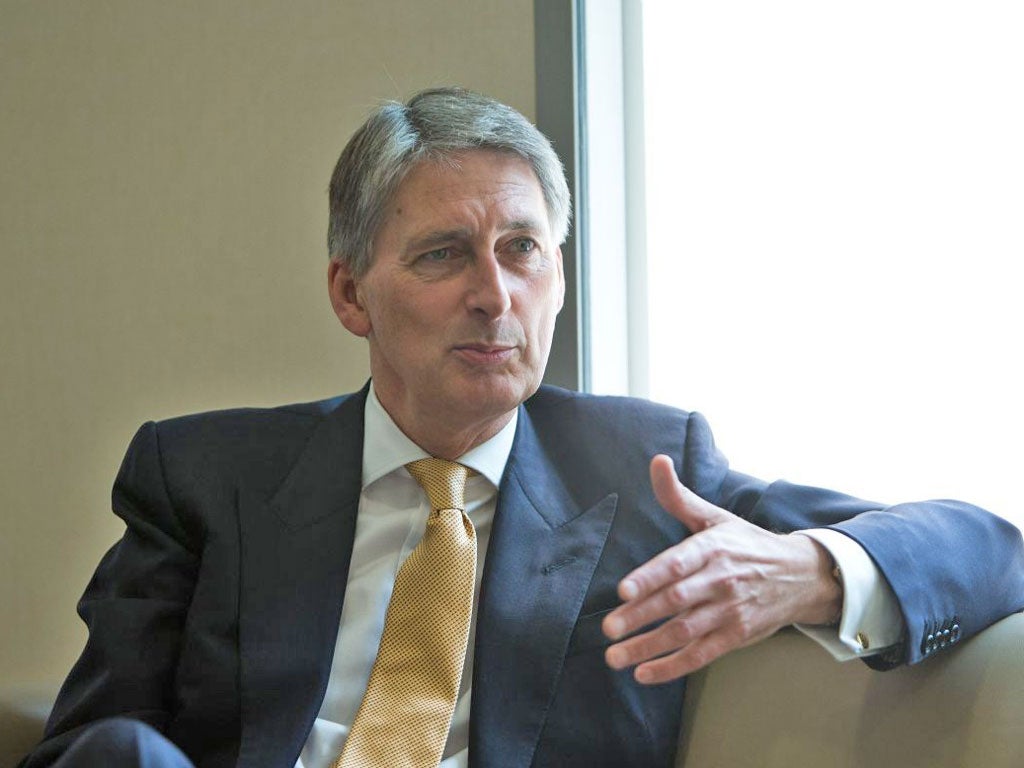Defence Secretary Philip Hammond warns David Cameron to cut the welfare budget, not defence spending

Your support helps us to tell the story
From reproductive rights to climate change to Big Tech, The Independent is on the ground when the story is developing. Whether it's investigating the financials of Elon Musk's pro-Trump PAC or producing our latest documentary, 'The A Word', which shines a light on the American women fighting for reproductive rights, we know how important it is to parse out the facts from the messaging.
At such a critical moment in US history, we need reporters on the ground. Your donation allows us to keep sending journalists to speak to both sides of the story.
The Independent is trusted by Americans across the entire political spectrum. And unlike many other quality news outlets, we choose not to lock Americans out of our reporting and analysis with paywalls. We believe quality journalism should be available to everyone, paid for by those who can afford it.
Your support makes all the difference.Defence Secretary Philip Hammond has warned he will resist further cuts to the armed forces in Chancellor George Osborne's forthcoming spending review.
After No 10 warned publicly last month that the military would not be immune from further financial retrenchment, Mr Hammond made clear that he would resist anything more than modest “efficiency savings”.
In an interview with The Daily Telegraph, he said other Conservative Cabinet ministers believed that the greatest burden of any cuts should fall on the welfare budget.
There was, he said, a “body of opinion within Cabinet who believes that we have to look at the welfare budget again”, and that “we should be seeing welfare spending falling” as a result of rising employment levels.
He said the “first priority” for the Government should be “defending the country and maintaining law and order” and that further defence cuts were not possible while meeting stated security objectives.
“I shall go into the spending review fighting the case for the defence budget on the basis that we have made very large cuts to defence, we've done that with the collaboration and co-operation of the military,” he said.
“Any further reduction in the defence budget would fall on the level of activity that we were able to carry out - the idea that expensively bought equipment may not be able to be used, expensively employed troops may not be able to be exercised and trained as regularly as they need to be.
“I am not going into the spending review offering any further reductions in personnel.”
Mr Hammond's comments are likely to be welcomed by Tory backbenchers who have been calling for a return to a core Conservative values in the wake of the party's trouncing in the Eastleigh by-election.
However they will also heighten tensions within the coalition, with the Liberal Democrats resisting a further squeeze on welfare spending.
It was being made clear Mr Hammond's comments were aimed particularly at the Lib Dems following remarks by senior Lib Dem ministers indicating that they believed welfare spending should be protected over defence.
A Whitehall source said: “There is a real concern that the Lib Dems wants to protect the benefits culture at the expense of the armed forces”.
Former Chief of the Air Staff, Sir Michael Graydon, agreed with Mr Hammond's view.
He told BBC Radio 5: “We have great capability gaps now, which we never had before. For example, we have no maritime patrol aircraft at all, we have no aircraft that can go on carriers - in fact we barely have carriers any longer.
“The army is now at a level, or will be shortly, it has never been that low for 200 years. That must surely worry people.”
Professor Michael Clarke, director-general of the Royal United Services Institute, told BBC Breakfast: “It's all a matter of risk analysis. If you don't think that the Armed Forces will be doing as much in the next five to eight years once Afghanistan is in the rear-view mirror then you might take that risk.”
But he warned: “The Armed Forces have been continuously in operation since 1991 when the Cold War came to an end so it would be a bit optimistic to think that that process which has gone on now for over 20 years would suddenly stop once we withdraw from Afghanistan.”
Speaking to the BBC, Mr Hammond said: “We won't be able to make further cuts without eroding military capability.
”Of course I understand the Chancellor's challenge. He has to find additional savings in order to consolidate the public finances as we have to do but we need to look broadly across government at how we are going to do that, not just narrowly at a few departments.“
Former Liberal Democrat leader Sir Menzies Campbell said: “If it would not seem flippant, I would say to Philip Hammond 'welcome to the club'.
“At last a defence secretary has publicly recognised that the long-running drip drip reduction in defence spending has materially eroded capability and seriously restricted the military options open to a British prime minister.
“The truth is that our publicly stated ambitions now significantly exceed our capacity.”
Tory backbencher Mark Pritchard said Mr Hammond could expect strong support from Conservative MPs.
"Defence cuts have gone far enough," he said.
"There will be zero political support from Conservative backbenchers for any additional cuts beyond those already announced in the SDSR.
"The Treasury needs to look elsewhere for additional savings."
Subscribe to Independent Premium to bookmark this article
Want to bookmark your favourite articles and stories to read or reference later? Start your Independent Premium subscription today.
Join our commenting forum
Join thought-provoking conversations, follow other Independent readers and see their replies
Comments